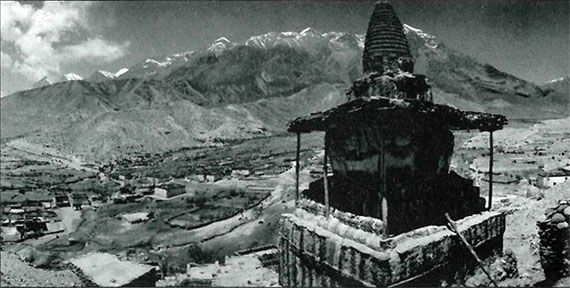
Mustang, Nepal, has been a trading route and Buddhist pilgrimage site for centuries. Although remote, Mustang is far from provincial. Thakali, an ethnic clan from Lower Mustang, make their homes around the globe, and many Loba, ethnic Tibetans from Lo (Upper Mustang) have emigrated to Kathmandu or the United States, in search of economic opportunities. Likewise, planes and helicopters land daily at Jomsom, Mustang’s district headquarters, delivering lowland goods and tourists. Still, Mustang is a place of footpaths and mule trains. But not for long.
Last summer, a coterie of officials convened at the Nepal/Tibet border for the Korallo-Jomsom Farm Road groundbreaking ceremony. At that time, six kilometers of earth stretching south had been graded into a motorable tract. The regional government views this endeavor as the seeds of a Himalayan highway that will provide a trade link between Mustang, Chinese-occupied Tibet, and Kathmandu. They believe the road will cheapen imports and facilitate the export of Mustang’s famous apples. District officials plan to encourage Nepal’s Ministry of Foreign Affairs to approach the Chinese to secure trans-boundary transport privileges. Informed sources say the road will also encourage mining in Upper Mustang.
Some locals fear political repercussions from traversing Chinese territory and favor building a road south from Jomsom along the deepest gorge in the world; others from Lower Mustang extrapolate that building a diesel-spewing road along their economic corridor—a landslide-prone stretch of earth—will be expensive and squelch tourism revenue. But alternatives to the road—such as a pulley transport system or augmenting helicopter flights—have not been fully explored.
Upper Mustang was opened on a restricted basis to tourists in 1992, a status that requires the region’s 1000 annual visitors to employ a trekking company, travel with a government liaison officer, and pay a restricted area fee of $70 per day. This generates $700,000 a year for the Nepali government. Sixty percent of these funds were to be allocated to Upper Mustang for community development projects; for the past two years, less than 3% has been returned, according to the Kathmandu-based, Mountain Forum, an internet organization dealing with development, conservation, and cultural issues in the Himalaya. If this road succeeds in connecting Mustang to Kathmandu via Tibet, a reassessment of Upper Mustang’s “restricted” status will be in order. However, changing this status is anathema to the Nepali government’s collection of restricted area fees and the Thakali monopoly on tourism and trade throughout Mustang.
For most Loba, the road comes laden with expectations of cash and cheaper goods, electricity, and education—accoutrements of the 20th century that elude the remote region. Moreover, a road could squander conservation efforts. Upper Mustang’s trans-Himalayan ecosystem harbors some of Asia’s most unique and threatened wildlife: Argali sheep, Tibetan wild ass, and snow leopards, as well as rare medicinal herbs. Yet no environmental impact assessment of the road has been undertaken. Upper Mustang may instead become inundated with Chinese goods, mostly cigarettes and alcohol.
The first stretch of road is being financed primarily by Upper Mustang’s village development committees; the Loba have also committed community labor resources. The King of Lo has expressed grave concerns about this project which could curtail tourism, increase local inflation, and harm the environment.
In the West, Upper Mustang is often viewed as a last bastion of “undisturbed” Tibetan culture. Yet many Loba feel they have been relegated to a cultural zoo and crave the symbols of development. The Korallo-Jomsom Farm Road gives us pause to consider impermanence: how modernity, in motorable stretches, changes an ancient Buddhist landscape.
—Sienna Craig
For Sienna Craig’s article about the horse culture of Mustang, see Tricycle’s Summer 1998 issue or theTricycle website: www.tricycle.com. Related websites include: www.drokpa.org; mf-asia@lyris.bellanet.org; and www.info-nepal.com.
Thank you for subscribing to Tricycle! As a nonprofit, we depend on readers like you to keep Buddhist teachings and practices widely available.